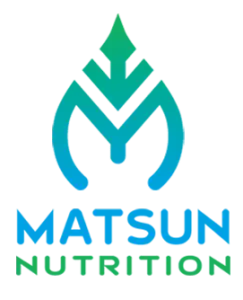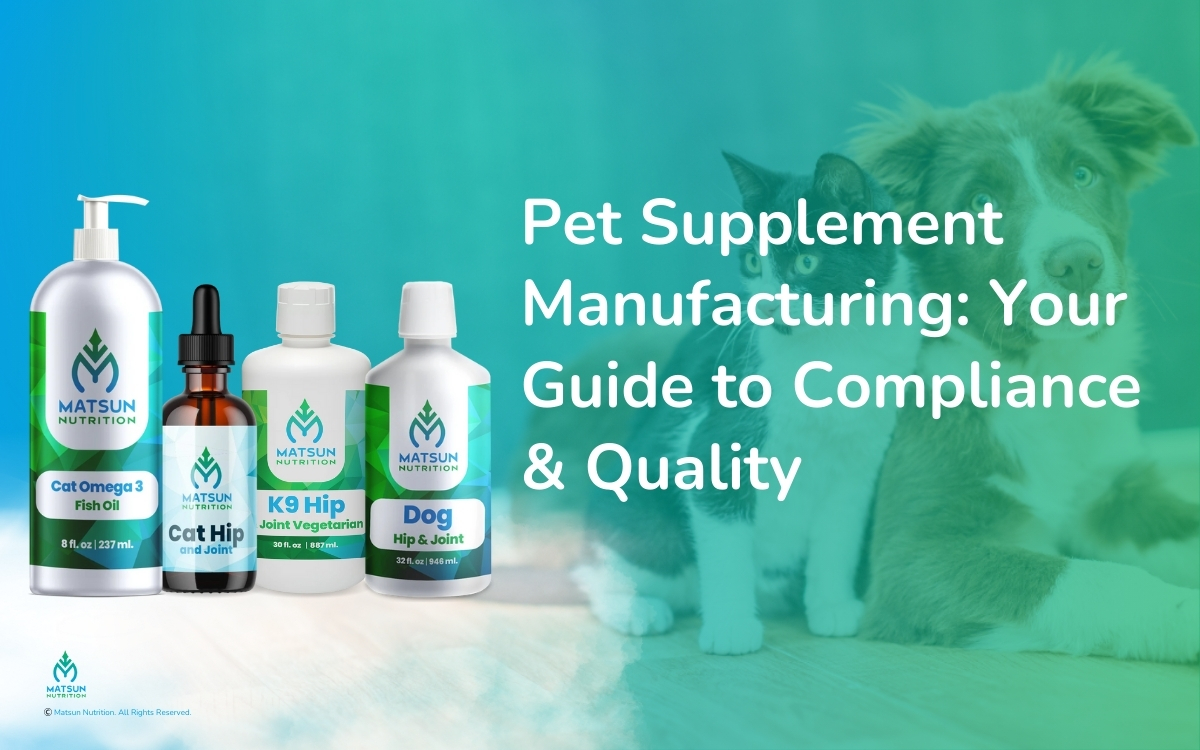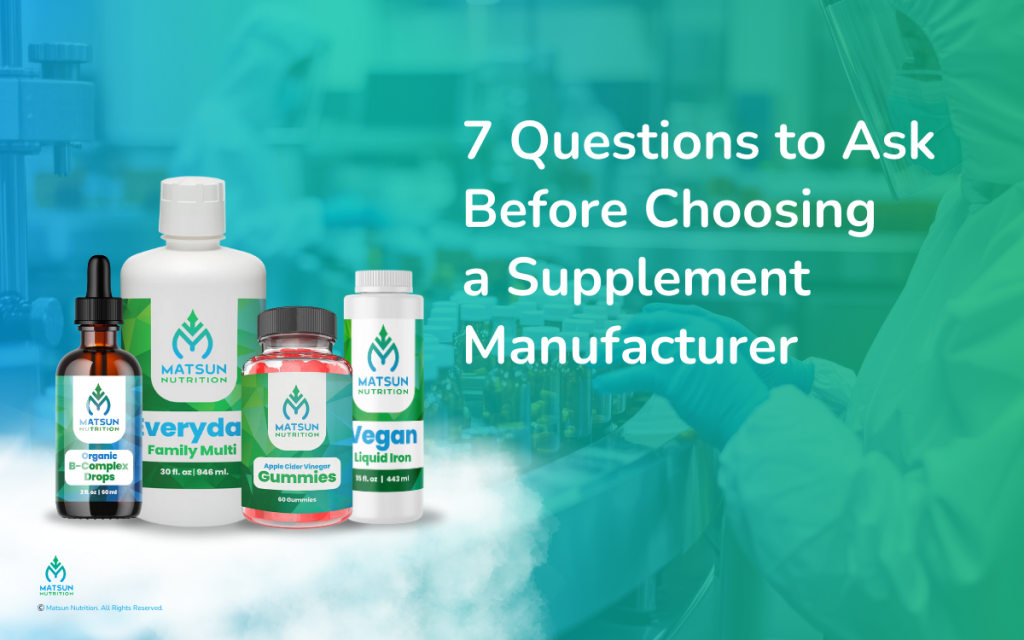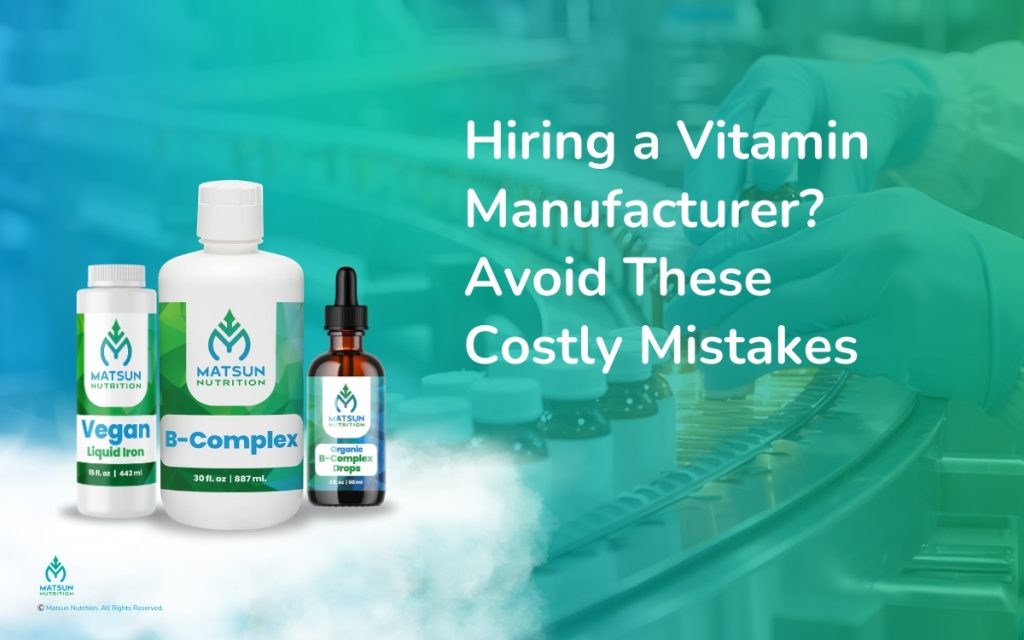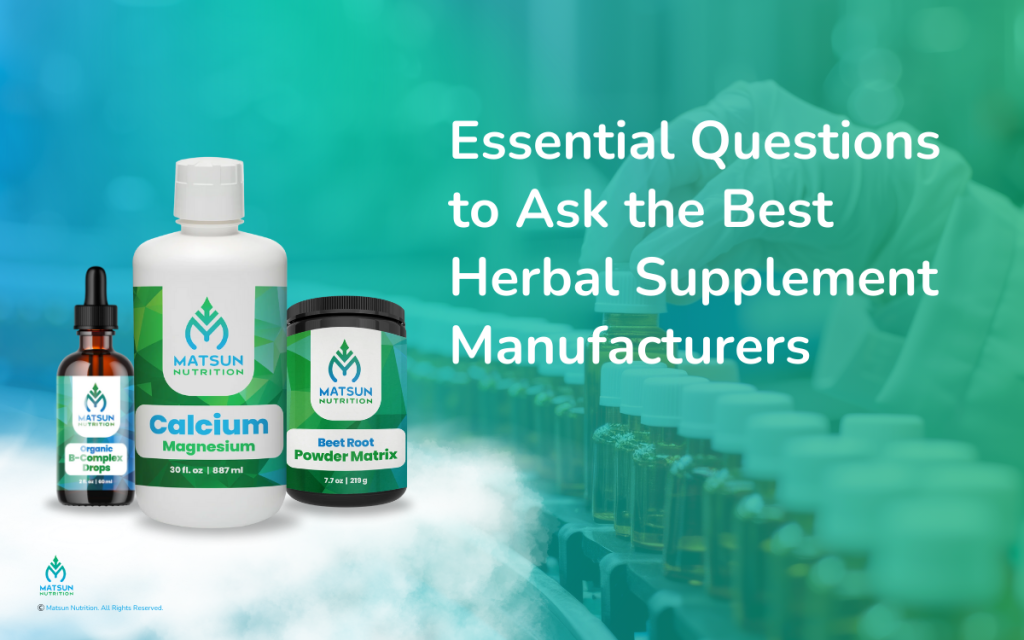Navigate pet supplement manufacturing with confidence. Our guide covers FDA, NASC, and AAFCO compliance along with the quality standards every growing pet brand should know. Pet supplement regulations can feel overwhelming at first, but they don’t have to be. We’ll walk you through the essentials so you can focus on creating safe, effective supplements that pets (and their humans) can trust.
The Rise of Pet Supplements: Quality is Key
Who isn’t a sucker for their dog? Like every other pet parent out there, I’m all in on keeping his tail wagging, whether that’s slipping him an extra treat or geeking out over the best supplements for his achy joints. No shock here, but the pet supplement market is going wild, with stuff for everything from shiny fur to chill vibes for upset stomachs.
The global pet supplement market is growing fast, expected to jump from $4.3 billion in 2023 to $7.5 billion by 2030, an average annual growth rate of 8.1%. But here’s the catch: with so many brands jumping in, cutting corners on quality or skipping regulations can spell disaster. A bad batch or a mislabeled product could tank your reputation, or worse, harm a pet.
Look, I get it, pet parents are super picky (yep, I’m one too!). We’re out here scanning labels, double-checking certifications, and basically turning into ingredient detectives before we buy anything for our furry babies. That’s why nailing quality and compliance isn’t just some box to tick, it’s the core of a thriving pet supplement business. Whether you’re kicking off a private label or starting small, getting this stuff right is do-or-die.
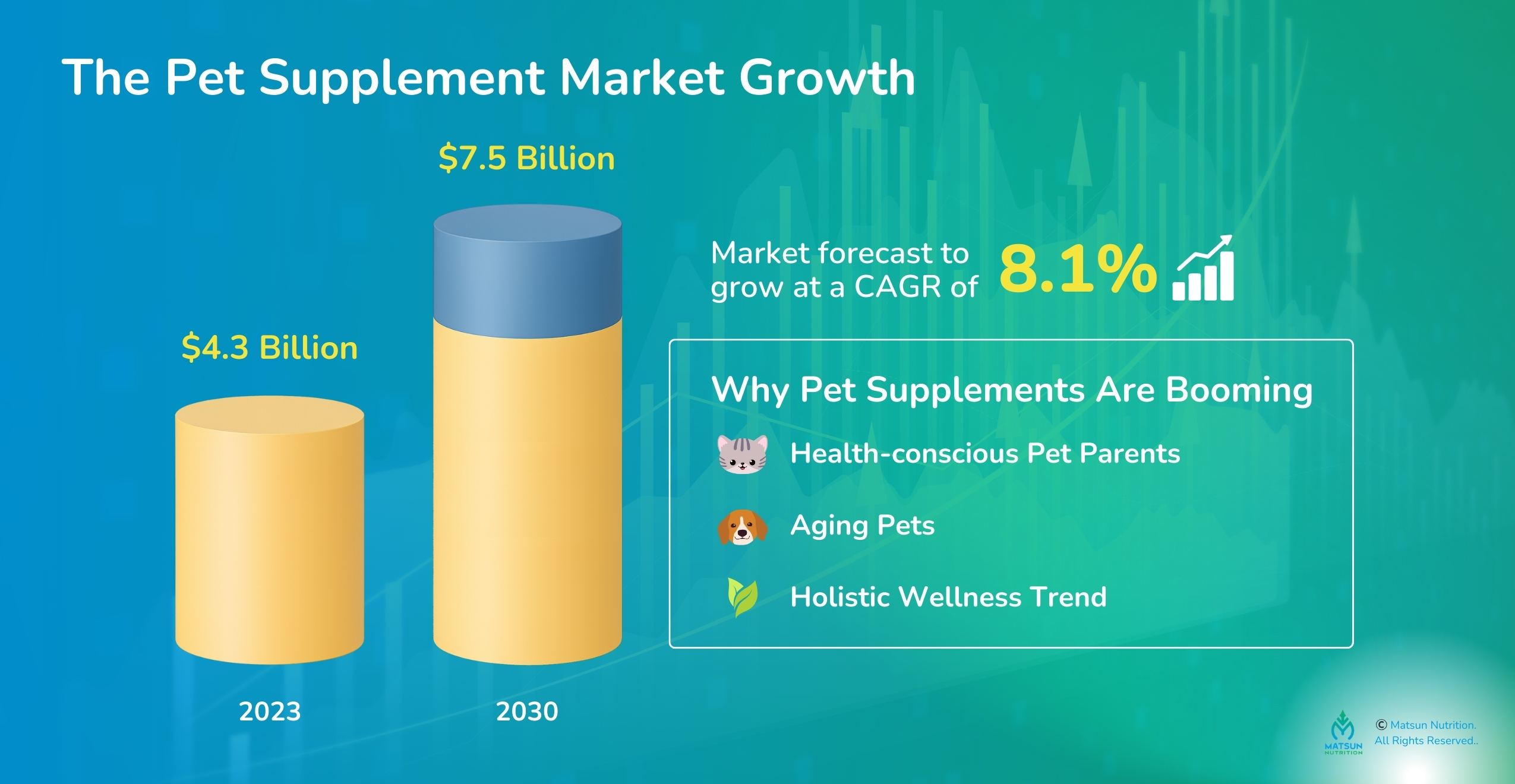
Understanding Pet Supplement Regulatory Bodies
Alright, so the FDA doesn’t mess around with pet supplement regulations; they treat ‘em like animal feed, which means they’re under the Federal Food, Drug, and Cosmetic Act. Serious business, right? Then there’s the National Animal Supplement Council (NASC), which isn’t a must but lays down some tough voluntary standards to keep the industry legit. And don’t forget the Association of American Feed Control Officials (AAFCO); their guidelines on ingredients and labeling are what most brands follow to stay on the up-and-up.
Each of these groups has a different focus, but they all aim to keep pets safe and brands accountable. Messing this up isn’t just a slap on the wrist. It could mean recalls or legal trouble. I remember reading about a 2023 recall where a dog supplement got pulled for contamination. That’s the kind of nightmare every brand wants to avoid.
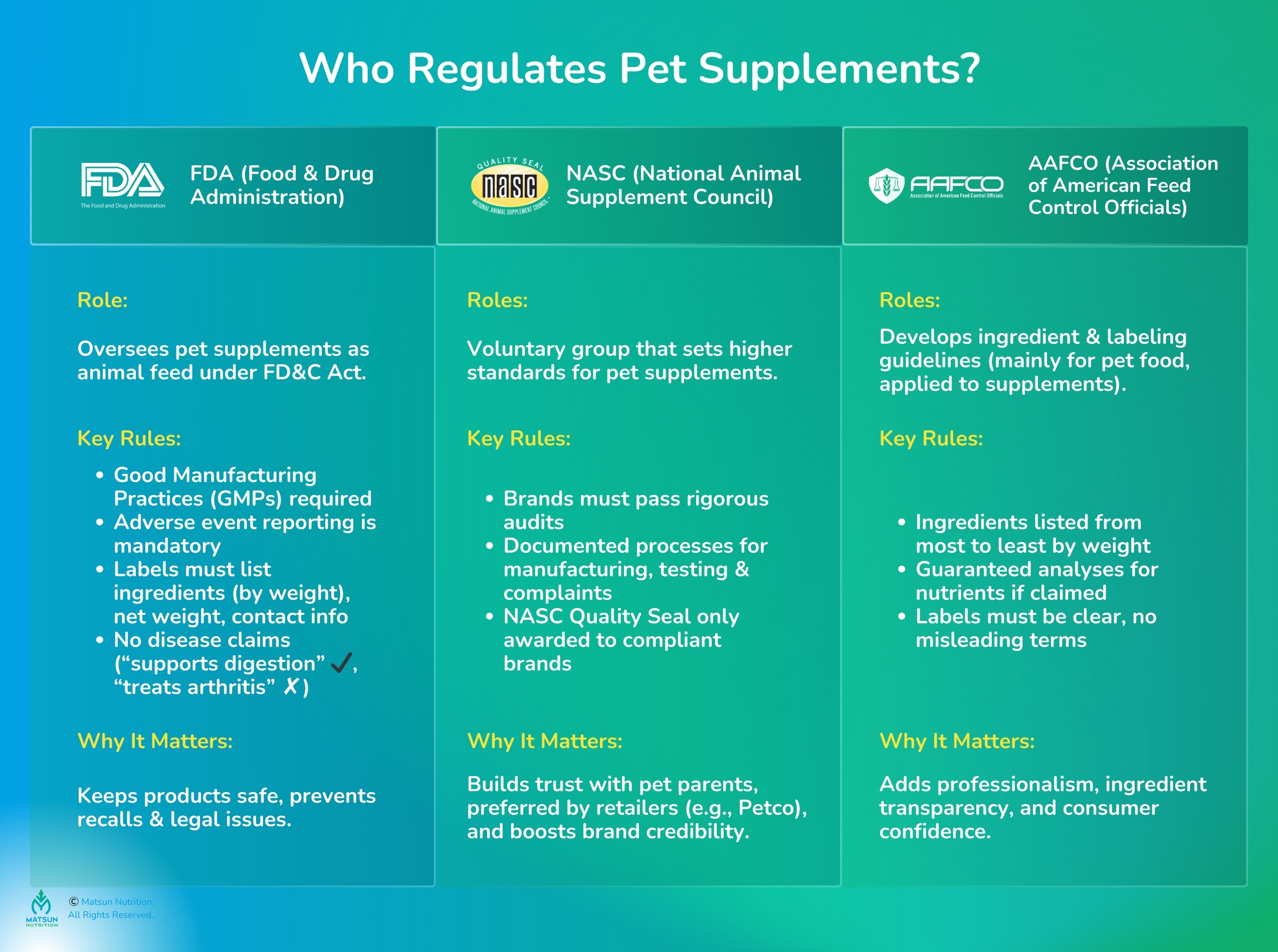
FDA Guidelines for Pet Supplement Compliance
The FDA is no joke with pet supplements! They don’t have to give your product the green light before it hits the market, but trust me, they’ll come knocking if something’s sketchy. Their rules, like the Good Manufacturing Practices (GMPs), are all about keeping things legit. Your facility’s gotta be squeaky clean, and you better have every single production step documented. It’s all to make sure your stuff is safe and doesn’t vary from batch to batch.
Here’s what you need to know about FDA rules:
- Adverse Event Reporting: If a pet gets sick after taking your supplement, you need to report it to the FDA. No exceptions.
- Labeling Accuracy: Your label needs to list every ingredient (in order of weight), the product’s net weight, and your contact info. No fudging the details.
- Avoid Prohibited Claims: You can’t say your supplement “treats” or “prevents” anything; that’s for drugs, not supplements. Stick to claims like “supports healthy digestion” and slap on the FDA disclaimer: “This statement has not been evaluated by the FDA. This product is not intended to diagnose, treat, cure, or prevent any disease.”
I heard about a company in 2024 hauled into court for claiming their supplement could “heal” arthritis in dogs. Big mistake. The FDA cracked down, and the brand took a huge hit. Staying on the right side of these rules is non-negotiable.
NASC Certification: Trust in Pet Supplement Quality
If you want pet owners to trust your pet supplement manufacturing brand, the National Animal Supplement Council (NASC) is your best ally. Their Quality Seal is a mark of excellence, proving your commitment to pet supplement regulatory compliance through rigorous audits. To earn NASC-compliant pet supplements certification, you need documented processes for every aspect of pet supplement manufacturing, from production and testing to handling customer complaints. It’s a demanding process, but the payoff is significant for private label pet supplements compliance and overall brand credibility.
Here’s why NASC certification is critical for pet supplement manufacturing:
- Builds Trust: Pet owners recognize the NASC seal as a sign of NASC-compliant pet supplements, ensuring your products are safe and reliable.
- Retailer Appeal: Major pet retailers, like Petco, often prioritize NASC-compliant pet supplements, giving your brand a competitive edge.
- Enhanced Compliance: NASC’s standards often exceed FDA guidelines for pet supplements, providing extra assurance for pet supplement regulatory compliance, including for organic pet supplement manufacturing.
Brand owners I’ve spoken with say NASC certification was a game-changer, helping them secure shelf space with top retailers. It’s a significant investment, but for pet supplement manufacturing, especially for private label pet supplements, it’s a powerful way to build a reputable, trustworthy brand.
AAFCO Standards: What Pet Supplement Brands Need
Alright, so AAFCO can be kinda tricky when it comes to supplements since their rules are mostly aimed at pet food. But don’t sleep on their guidelines, they’re a big deal! They spell out what ingredients are safe, like the right type of glucosamine for those joint supplements, and they push for labels that are clear and don’t mislead the customer.
AAFCO’s labeling tips include:
- List ingredients from most to least by weight.
- Include guaranteed analyses if you’re claiming specific nutrients.
- Don’t use vague terms that could mislead pet owners.
Following AAFCO’s guidelines for supplements isn’t something you have to do, but honestly, it’s a no-brainer. It gives your product that legit, professional vibe and keeps you out of hot water later. I’ve seen brands build a super loyal fan base just by being honest about what’s in their supplements.
Ensuring Quality in Pet Supplement Manufacturing
Look, quality isn’t just about checking off regulatory boxes; it’s about making something pet parents can trust. That means picking a manufacturer with a GMP-certified facility. Those places are good about keeping things clean, testing everything, and making sure every batch is on point.
Here’s how to lock in quality:
- Batch Testing: Test every batch for potency and contaminants. No shortcuts.
- Traceability: Keep records so you can track every ingredient back to its source.
- Expert Formulation: Work with pros to create balanced formulas that work.
I once read about a brand that skipped batch testing to save money. Guess what? They had to recall thousands of bottles after finding mold. Don’t be that brand. Quality is your safety net.
Sourcing Compliant Ingredients for Pet Formulas
Look, ingredients are the soul of your pet supplement, so you gotta source them right; it’s a big deal! Stick to stuff approved by the FDA or AAFCO, especially if you’re aiming for organic pet supplements. That means teaming up with suppliers who’ve got Certificates of Analysis (COAs) to show their ingredients are pure and pack the right punch.
Tips for sourcing:
- Vet Your Suppliers: Only deal with the legit ones who can prove their stuff is top-notch.
- Keep It Safe: Dodge sketchy ingredients like artificial preservatives that are banned in some places.
- Stay Transparent: Make sure you can track every single ingredient back to where it came from.
I’ve seen brands win over customers just by being open about where their ingredients come from. It’s a simple way to stand out in a crowded market.
Testing & Documentation for Pet Supplement Safety
Testing isn’t the most glamorous part of pet supplement manufacturing, but it’s a game-changer for pet supplement market compliance. Third-party testing for pet supplements, including those for cat supplement manufacturing, checks for harmful contaminants like heavy metals, bacteria, or pesticides that could endanger pets. Adhering to pet supplement testing requirements is critical for avoiding pet supplement recalls and ensuring safety. Common tests include:
- Microbial Testing: Ensures no Salmonella or other pathogens are present in your pet supplement.
- Potency Testing: Verifies that active ingredients, per pet supplement formulation guidelines, are present in the correct amounts.
- Stability Testing: Confirms your pet supplement remains effective until its expiration date.
Detailed documentation is equally vital in pet supplement manufacturing. Maintain comprehensive records of every test, ingredient, and production step to meet pet supplement testing requirements. These records are essential if the FDA or NASC audits your operation, proving compliance with pet supplement market compliance standards. They’re also crucial for claims like “vet-approved pet supplements,” reinforcing trust in your cat supplement manufacturing or broader pet supplement brand. Thorough testing and documentation are your safety net for avoiding pet supplement recalls and building a reputable product.
RELATED READ:
Learn How to Launch a Private Label Pet Supplements Brand in 90 Days
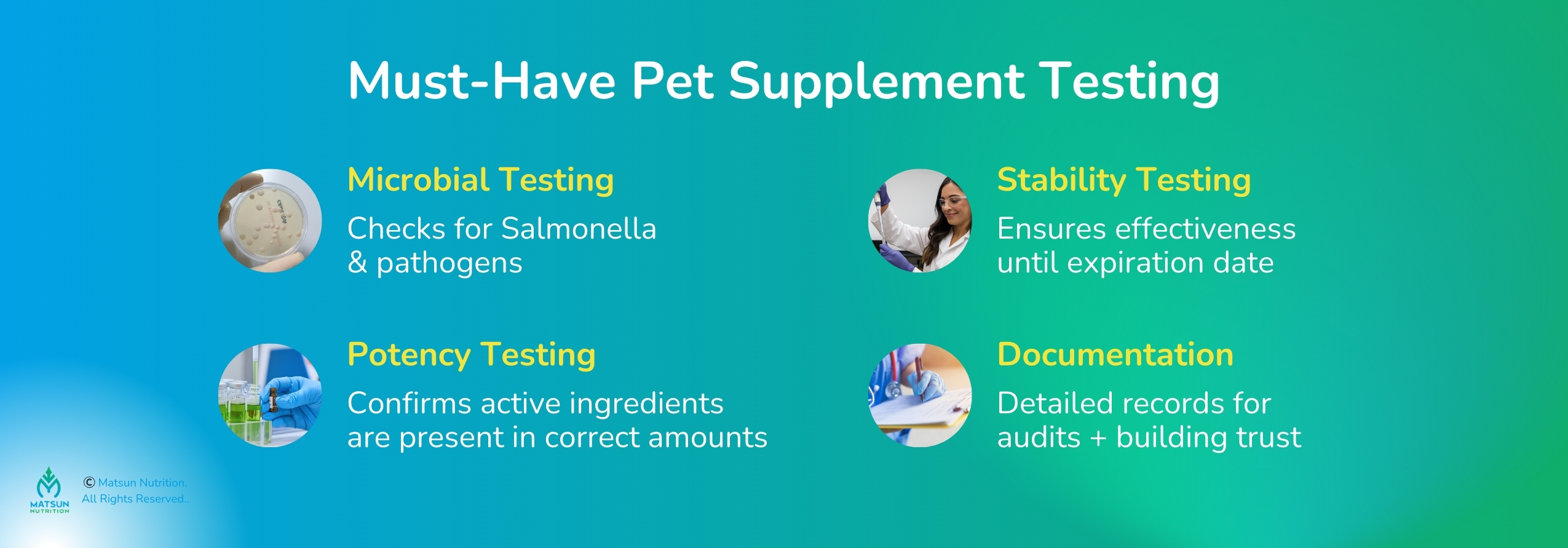
Labeling & Marketing Pet Supplements Legally
Labeling and marketing are critical areas where pet supplement manufacturing brands often stumble. To comply with pet supplement labeling laws and pet nutraceutical regulations, your label must be transparent, listing all safe pet supplement ingredients, net weight, and contact information for your pet supplement manufacturer in the USA.
If you’re making structure/function claims like “supports coat health” for custom pet supplement manufacturing, include the FDA disclaimer: “This statement has not been evaluated by the FDA. This product is not intended to diagnose, treat, cure, or prevent any disease.”
For marketing, avoid prohibited terms like “reduces inflammation” to stay compliant with dog supplement regulations and broader pet nutraceutical regulations. Instead, use phrases like “promotes joint comfort” to align with pet supplement market compliance. I’ve seen brands waste thousands on marketing campaigns for quality pet supplement manufacturing only to scrap them for non-compliance. Partnering with a legal expert to review labels and ads ensures your custom pet supplement manufacturing meets pet supplement labeling laws, protecting your brand and investment.
Choosing a Compliant Pet Supplement Partner
Picking the right manufacturer is like choosing a business partner; you need someone you can trust. Look for a pet supplement manufacturer in the USA with:
- GMP Certification: Proof that they follow strict quality standards.
- NASC Membership: Shows they’re serious about compliance.
- Low MOQs: Great for startups or small batch pet supplement manufacturing.
- Customization: Offers options for private label pet supplements.
A partner like Matsun Nutrition can handle everything from formulation to packaging, making compliance a breeze. They even offer Low MOQs options for new brands.
Future Trends in Pet Supplement Compliance
Pet parents these days are all about eco-friendly packaging, custom-blended formulas, and brands that spill the tea on every single ingredient. And with regulators cracking down as the pet supplement world blows up, you gotta stay sharp. Keeping up means watching trends like:
- Eco-Friendly Practices: Think biodegradable packaging or sustainably sourced ingredients.
- Custom Formulas: Supplements tailored to specific breeds or health needs.
- Clearer Labels: Pet parents want to know exactly what’s in their pet’s supplements.
Partnering with a forward-thinking manufacturer can help you stay ahead of the curve and keep your brand competitive.
Ready to start your pet supplement brand? Matsun Nutrition offers compliant, high-quality manufacturing for private label liquid pet supplements and more. Contact us today to bring your vision to life!
FAQs
Are pet supplements FDA regulated?
Yes, the FDA oversees pet supplements as animal feed, enforcing safety and labeling rules under the FD&C Act. However, they don’t pre-approve supplements, so it’s up to manufacturers to ensure compliance.
What is NASC certification for pet supplements?
NASC certification is a voluntary quality seal that shows a brand meets strict manufacturing and labeling standards. It also requires regular audits and adverse event reporting to maintain transparency and trust.
Does AAFCO apply to pet supplements?
AAFCO’s guidelines are voluntary for supplements but help with ingredient safety and clear labeling. While not legally binding, many reputable manufacturers follow them to ensure credibility.
How to ensure pet supplement quality?
Use GMP-certified facilities, test every batch, and source traceable ingredients. Partnering with experienced manufacturers also helps maintain consistent product standards.
Do pet supplements need COAs?
Yes, COAs prove ingredient purity and potency, ensuring safety and compliance. They’re also valuable proof points for customers and retailers seeking transparency.
Can my pet supplement be organic certified?
Absolutely, but you’ll need certified organic ingredients verified by a USDA-accredited agency. The final product must also be produced in a certified organic facility to carry the USDA seal.
How to market compliant pet supplements?
Stick to structure/function claims like “supports health” and include the FDA disclaimer. Avoid disease-related claims to stay within regulatory boundaries.
What is the MOQ for pet supplement manufacturing?
MOQs vary, but partners like Matsun Nutrition offer low options for startups. This allows smaller brands to enter the market without large upfront investments.
Who tests pet supplements for compliance?
Third-party labs handle testing for contaminants, potency, and stability to meet FDA and NASC standards. These labs provide detailed reports that help ensure your product is both safe and effective.
